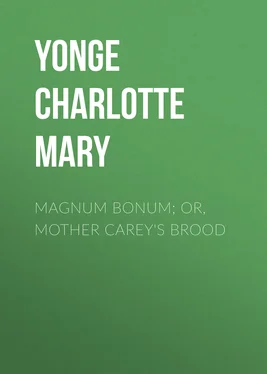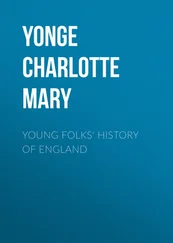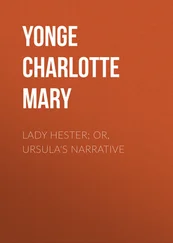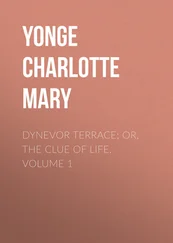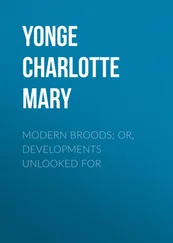Charlotte Yonge - Magnum Bonum; Or, Mother Carey's Brood
Здесь есть возможность читать онлайн «Charlotte Yonge - Magnum Bonum; Or, Mother Carey's Brood» — ознакомительный отрывок электронной книги совершенно бесплатно, а после прочтения отрывка купить полную версию. В некоторых случаях можно слушать аудио, скачать через торрент в формате fb2 и присутствует краткое содержание. Издательство: Иностранный паблик, Жанр: foreign_prose, literature_19, Европейская старинная литература, foreign_antique, на английском языке. Описание произведения, (предисловие) а так же отзывы посетителей доступны на портале библиотеки ЛибКат.
- Название:Magnum Bonum; Or, Mother Carey's Brood
- Автор:
- Издательство:Иностранный паблик
- Жанр:
- Год:неизвестен
- ISBN:нет данных
- Рейтинг книги:5 / 5. Голосов: 1
-
Избранное:Добавить в избранное
- Отзывы:
-
Ваша оценка:
- 100
- 1
- 2
- 3
- 4
- 5
Magnum Bonum; Or, Mother Carey's Brood: краткое содержание, описание и аннотация
Предлагаем к чтению аннотацию, описание, краткое содержание или предисловие (зависит от того, что написал сам автор книги «Magnum Bonum; Or, Mother Carey's Brood»). Если вы не нашли необходимую информацию о книге — напишите в комментариях, мы постараемся отыскать её.
Magnum Bonum; Or, Mother Carey's Brood — читать онлайн ознакомительный отрывок
Ниже представлен текст книги, разбитый по страницам. Система сохранения места последней прочитанной страницы, позволяет с удобством читать онлайн бесплатно книгу «Magnum Bonum; Or, Mother Carey's Brood», без необходимости каждый раз заново искать на чём Вы остановились. Поставьте закладку, и сможете в любой момент перейти на страницу, на которой закончили чтение.
Интервал:
Закладка:
Ellen knew Carey thought she had said something very clever, but was all the more unconvinced.
CHAPTER XII. – KING MIDAS
When I did him at this advantage take,
An ass’s nowl I fixed upon his head.
In the early spring an unlooked-for obstacle arose to all wanderings in the Belforest woods. The owner returned and closed the gates. From time that seemed immemorial, the inhabitants of Kenminster had disported themselves there as if the grounds had been kept up for their sole behoof, and their indignation at the monopoly knew no bounds.
Nobody saw Mr. Barnes save his doctor, whose carriage was the only one admitted within the lodge gates, intending visitors being there informed that Mr. Barnes was too unwell to be disturbed.
Mrs. “Folly” Brownlow’s aberrations lost their interest in the Coffinkey world beside the mystery of Belforest. Opinions varied as to his being a miser, or a lunatic, a prey to conscience, disease, or deformity; and reports were so diverse, that at the “Folly” a journal was kept of them, with their dates, as a matter of curiosity—their authorities marked:—
March 4th.—Mr. Barnes eats nothing but fresh turtle. Brings them down in tubs alive and flapping. Mrs. Coffinkey’s Jane heard them cooing at the station. Gives his cook three hundred pounds per annum.
5th.—Mr. Barnes so miserly, that he turned away the housemaid for burning candles eight to the pound. (H. S. H.)
6th.—Mr. B. keeps a bloodhound trained to hunt Indians, and has six pounds of prime beef steaks for it every day. (Emma.)
8th.—Mr. B.‘s library is decorated with a string of human ears, the clippings of his slaves in “the Indies.” (Nurse.)
12th.—Mr. B. whipped a little black boy to death, and is so haunted by remorse, that he can’t sleep without wax-candles burning all round him. (Mrs. Coffinkey’s sister-in-law.)
14th.—Mr. Barnes’s income is five hundred thousand pounds, and he does not live at the rate of two hundred pounds. (Col. Brownlow.)
l5th.—He has turned off all his gardeners, and the place will be desolation. (H. S. H.)
16th.—He did turn off one gardener’s boy for staring at him when he was being wheeled about in his bath-chair. (Alfred Richards.)
17th.—He threw a stone, which cut the boy’s head open, and he lies at the hospital in a dangerous state. (Emma.)
18th.—Mr. Barnes was crossed in love when he was a young man by one Miss Anne Thorpe, and has never been the same man since, but has hated all society. (Query: Is this a version of being a misanthrope?)
19th.—He is a most unhappy man, who has sacrificed all family affections and all humanity to gold, and whose conscience will not let him rest. He is worn to a shadow, and is at war with mankind. In fine, he is a lesson to weak human nature. (Mrs. Rigby.)
22nd.—All his toilet apparatus is of “virgin gold;” he lets nothing else touch him. (Jessie.)
“Exactly like King Midas.” (Babie.)
The exclusion from the grounds was a serious grievance, entailing much loss of time and hindrance to the many who had profited by the private roads. The Sunday promenade was a great deprivation; nurses and children were cut off from grass and shade, and Mother Carey and her brood from all the delights of the enchanted ground.
She could bear the loss better than in that first wild restlessness, which only free nature could allay. She had made her occupations, and knew of other haunts, though many a longing eye was cast at the sweet green wilderness, and many regrets spent on the rambles, the sketches, the plants, and the creatures that had seemed the certain entertainment of the summer.
To one class of the population the prohibition only gave greater zest—namely, the boys. Should there be birds’ nests in Belforest unscathed by the youth of St. Kenelm’s? What were notice-boards, palings, or walls to boys with arms and legs ready to defy even the celebrated man-traps of Ellangowan, “which, if a man goes in, they will break a horse’s leg?” The terrific bloodhound alarmed a few till his existence was denied by Alfred Richards, the agent’s son; and dodging the keepers was a new and exciting sport. At first, these men were not solicitous for captures, but their negligence was so often detected, that they began to believe that their master kept telescopes that could penetrate through trees, and their vigilance increased.
Bobus, in quest of green hellebore, got off with a warning; but a week later, Robin and Jock were inspecting the heronry, when they caught sight of a keeper, and dashed off to find themselves running into the jaws of another. Swift as lightning, Jock sprung up into an ivied ash; but the less ready Bob was caught by the leg as he mounted, and pulled down again, while his captor shouted, “If there’s any more of you young varmint up yonder, you’d best come down before I fires up into the hoivy.”
He made a click and pointed his gun, and Robin shrieked, “Oh, don’t! We are Colonel Brownlow’s sons; at least, I mean nephews. Don’t! I say. Skipjack, come down.”
“You ass!” muttered Jack, as he crackled down, and was collared by the keeper. “Hollo! what’s that for?”
“Now, young gents, why will you come larking here to get a poor chap out of his situation. It’s as much as my place is worth not to summons you, and yet I don’t half like to do it to young gents like you.”
“What could they do to us?” asked Jock.
“Well, sir, may be they’d keep you in the lock-up all night; and what would your papa and mamma say to that?”
“My father is Colonel Brownlow,” growled Robin.
“More shame for you, sir, to want to get a poor man out of his place.”
“Look here, my man,” said Jock with London sharpness and impudence, “if you want to bully us into tipping you, it’s no go. We’ve only got one copper between us, and nothing else but our knives; and if we had, we wouldn’t do such a sneaking thing!”
“I never meant no such thing, sir,” said the keeper; “only in case Mr. Barnes should hear of our good nature.”
“Come along, Robin,” said Jock; “if we are had up, we’ll let ‘em know how Leggings wanted us to buy off!”
Wherewith Jock made a rush, Rob plunged after him into the brambles, and they never halted till they had tumbled over the park wall, and lay in a breathless heap on the other side. The adventure was the fruitful cause of mirth at the Folly, but not a word was breathed of it at Kencroft.
A few other lads did actually pay toll to the keepers, and some penniless ones were brought before the magistrates and fined for trespass, “because they could not afford it,” as Caroline said, and to the Colonel’s great disgust she sent two sovereigns by Allen to pay their fines and set them free.
“It was my own money,” she said, in self-defence, “earned by my models of fungi.”
The Colonel thought it an unsatisfactory justification, and told her that she would lay up trouble for herself by thus encouraging insubordination. He little thought that the laugh in her eyes was at his complacent ignorance of his own son’s narrow escape.
Allen was at home for Easter, when Eton gave longer holidays than did St. Kenelm, so that his brothers were at work again long before he was. One afternoon, which had ended in a soaking mist, the two pairs of Roberts and Johns encountered him at the Folly gate so disguised in mud that they hardly recognised the dainty Etonian.
“That brute Barnes,” he ejaculated; “I had to come miles round through a disgusting lane. I wish I had gone on. I’d have proved the right of way if he chose to prosecute me!”
“Father says that’s no go,” said Robin.
Читать дальшеИнтервал:
Закладка:
Похожие книги на «Magnum Bonum; Or, Mother Carey's Brood»
Представляем Вашему вниманию похожие книги на «Magnum Bonum; Or, Mother Carey's Brood» списком для выбора. Мы отобрали схожую по названию и смыслу литературу в надежде предоставить читателям больше вариантов отыскать новые, интересные, ещё непрочитанные произведения.
Обсуждение, отзывы о книге «Magnum Bonum; Or, Mother Carey's Brood» и просто собственные мнения читателей. Оставьте ваши комментарии, напишите, что Вы думаете о произведении, его смысле или главных героях. Укажите что конкретно понравилось, а что нет, и почему Вы так считаете.
